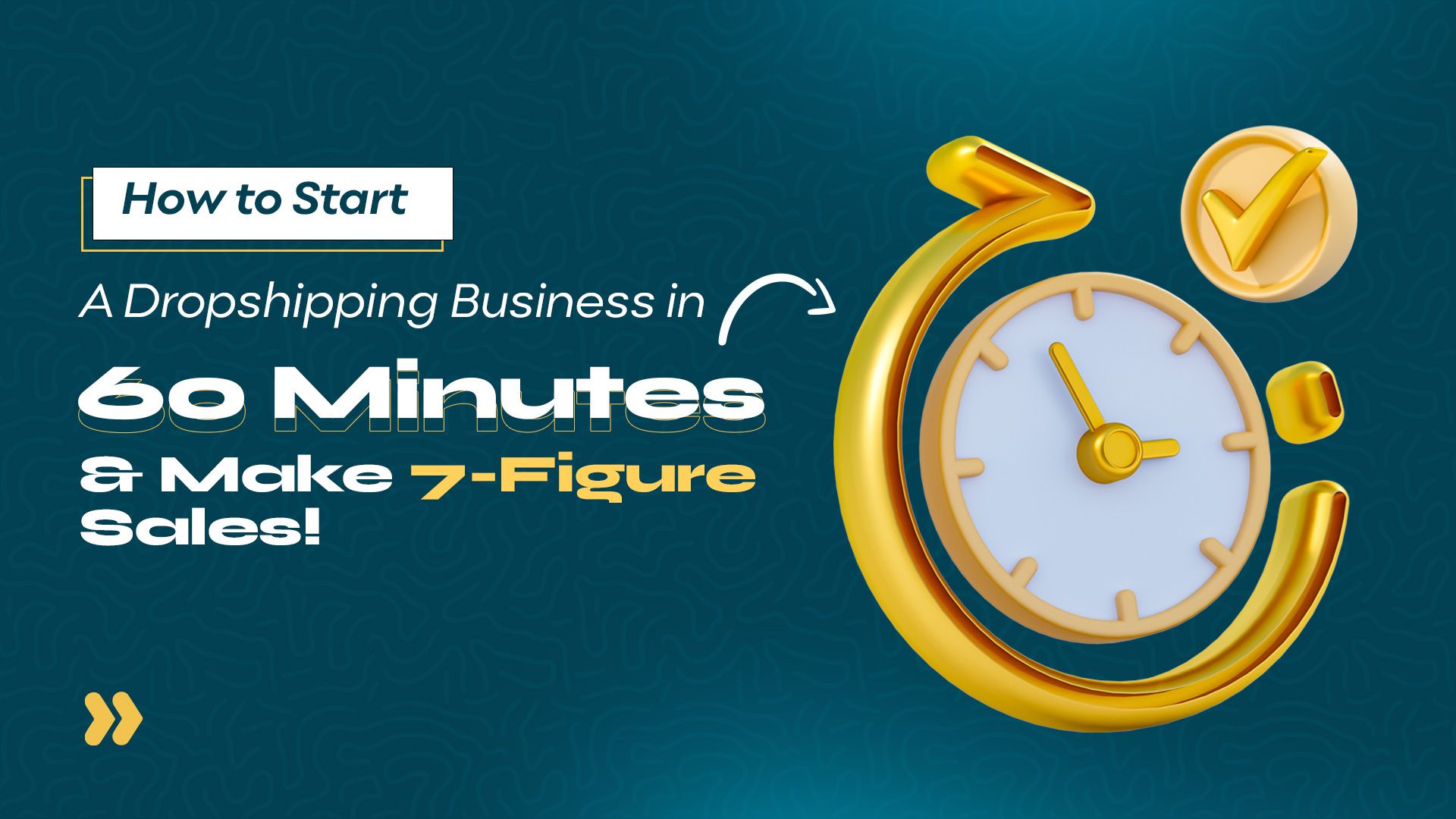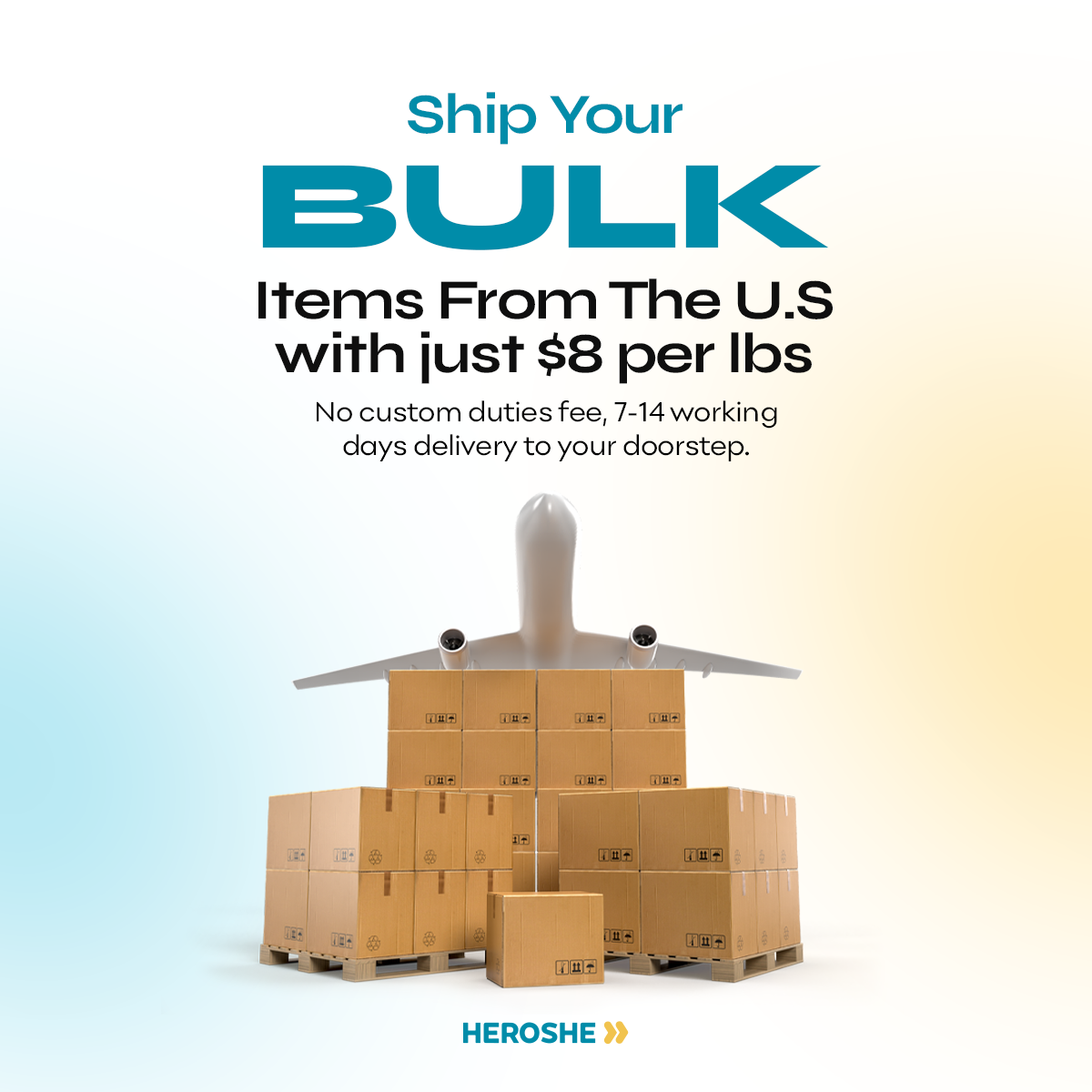How to Start Dropshipping in Nigeria

Hey there! Have you thought of starting dropshipping? It is a business model that has recently gained popularity because it offers an excellent way for entrepreneurs to start an online store without needing a big upfront investment. You don't have to worry about holding any inventory yourself. You buy products from a wholesale supplier abroad who then ships them directly to your customers in Nigeria. How awesome is that?
The best part about dropshipping is that there are a lot of benefits to starting this kind of business. For one thing, you don't have to worry about high capital or the hassle of finding a physical location. Plus, you can work from anywhere in Nigeria, which is incredible if you don't like Lagos stress. And since you can offer a wide range of products, the possibilities for your business are endless.
With that said, starting dropshipping in Nigeria can be overwhelming. There are many factors to consider, such as finding the right dropshipping niche and platform, locating the best suppliers, and creating a successful marketing strategy. But don't worry! This article will walk you through the entire process and show you how to start a successful dropshipping business in Nigeria in just 60 minutes.
What is Dropshipping?
Dropshipping is an order fulfillment method that makes it possible for businesses to sell products without keeping them in stock. Instead, when a customer places an order, the business buys the product from a third-party supplier who then ships it directly to the customer. This means that the business doesn't have to handle the product physically.
Dropshipping is an order fulfillment method that makes it possible for businesses to sell products without keeping them in stock. Instead, when a customer places an order, the business buys the product from a third-party supplier who then ships it directly to the customer.
This short animated video explains how dropshipping works:
How To Start Dropshipping In Nigeria
Here is how to start dropshipping in Nigeria:
Step 1: Choosing a Profitable Niche
Choosing a profitable niche for your business in Nigeria is like setting the stage for success. It is a bit like finding the right dance partner – it should be a good fit, and you both need to be in sync. So, here are some tips to help you waltz your way into a profitable niche with strong profit margins:
Follow Your Passion and Curiosity:
Imagine running a business in an area you love talking about and exploring. Your enthusiasm will shine through, making your marketing efforts more authentic. For instance, if you are into fitness, you could explore niches like yoga gear, workout gadgets, or athleisure wear.
Market Demand Check:
Checking market demand is like peeking into a party before you jump in. Tools like Google Trends let you see how popular a particular product or niche is over time in Nigeria. Look for consistent interest and avoid niches with erratic popularity patterns. Also, Google Ads can tell you how often people search for certain words. This gives you an idea of how much people want something. Remember, finding out what people want can help you pick the right stuff to sell in your business.
Look For Gaps In The Market:
Like spotting an available teller in a crowded bank hall, research products that are in demand but not readily available. Research what products are doing well on platforms like Amazon, eBay, or social media. Are there items that Nigerians love but are in short supply? This is where you could find a promising opportunity for your dropshipping store.
Spy on Your Competitors (Shhh, We Won’t Tell):
Spying on your competitors isn't naughty here; it is savvy! When starting dropshipping in Nigeria, you should check out what other similar companies are doing. This is like peeking at their playbook to see what is working and what is not. You can learn what customers like by looking at their products and their brand positioning. You don't have to copy them exactly, but you can get smart ideas to make your business memorable.
Checking out your competition helps you figure out how to do things better. You can see what products they have and how much they charge. This lets you decide what to sell and how to make your prices attractive. Also, you might notice things they could be doing better, like slow shipping or not being very helpful to customers. This is your chance to stand out by doing those things better. Watching what your competition is up to can help your dropshipping business do well.
Choosing a profitable dropshipping niche is like finding a dance partner you can groove with. It should align with your passion, show promise for profitability, and let you bring something unique to the floor, all while keeping an eye on those enticing profit margins. So, put on your entrepreneurial dancing shoes and waltz into a niche that makes your heart skip a beat!

Step 2: Choosing the Right Platform for Your Dropshipping Business
When you want to start dropshipping in Nigeria, choosing the right platform is crucial and can affect how well your business does. The platform you choose is like the base for your online store. It decides how easy it is to handle products, deal with orders, and make shopping easy for your customers. Here are some of the most popular platforms for dropshipping:
Shopify:
Shopify stands out as one of the leading dropshipping platforms due to its user-friendly interface and a wide array of features tailored to e-commerce needs. With an extensive library of themes, you can customize the look and feel of your store to match your brand.

One of its key advantages is the availability of many third-party apps and services through the Shopify App Store. This enables you to extend the functionality of your store, from marketing tools to inventory management systems. Shopify might be your ideal choice if you want a comprehensive solution that offers both ease of use and scalability.
WooCommerce:
If you are already familiar with WordPress, WooCommerce could be appealing. This free plugin transforms your WordPress website into a fully functional online store. Since WordPress is widely used for content creation, WooCommerce seamlessly integrates e-commerce capabilities into your existing site.

This platform gives you many options and lets you make your online store look and work the way you want. If you are comfortable with some technical stuff, you can change how your store looks to fit your desires. But remember, using this platform might need more time and attention than other platforms.
BigCommerce:
BigCommerce is like a big toolbox with everything you need for your dropshipping business. It is easy to use, so you will find it helpful even if you are starting out. And if your business gets bigger, it still has lots of useful stuff.

The customizable themes enable you to create a unique store design and integrate well with other tools you might want to use. It also takes care of important things like security, hosting, and optimization, so you can focus on growing your business.
When choosing the right platform, consider factors such as your technical expertise, budget, scalability needs, and desired level of customization. Each platform has strengths and weaknesses, so take the time to assess which aligns best with your business goals.
Step 3: Setting Up Your Dropshipping Business Website or Online Store
After choosing the right platform \, the next step is to create a website or online store. This part is important because it is where you show off your stuff, talk to people interested in buying, and make sales happen. Here are the key steps and considerations to keep in mind:
Choose a Domain Name:
Your domain name is your online address and an integral part of your brand identity. When choosing a domain name, use names that are easy to remember, relevant to your niche, and reflect your brand. A domain that aligns with your business's offerings can help customers easily remember and find your site.
Select a Theme:
The theme you choose for your website plays a significant role in determining its appearance and user experience. Opt for a visually appealing theme that aligns with your brand's aesthetics. Additionally, ensure that the theme is user-friendly, making it easy for visitors to navigate your site and find products. With the increasing use of mobile devices for online shopping, optimize for mobile responsiveness.

Add Products:
Adding products to your store is a core aspect of your dropshipping business in Nigeria. Depending on your platform, you can import products from your chosen suppliers or add them manually. When adding products, include high-quality images, detailed descriptions, and relevant information such as pricing and available variants. Organize your products into relevant categories to facilitate smooth navigation for customers.
Product Descriptions and SEO:
Craft great product descriptions that give customers all the information about the products. Additionally, consider incorporating relevant keywords in your descriptions to improve search engine visibility. This practice, called Search Engine Optimization (SEO), can help your products rank higher in search results and attract organic traffic to your store.

Payment Gateways and Checkout:
Integrate safe and secure payment gateways to offer a seamless checkout experience for your customers. There are different payment platforms out there, so choose ones that are trustworthy in your target market. A smooth checkout process can significantly impact your conversion rates.
Shipping and Returns Information:
Clearly communicate your shipping and return policies to customers. Transparency in these areas helps build trust and manage customer expectations. Let your customers know if your stores have longer shipping times due to international suppliers.
Related: Reasons Why You Need Fast and Reliable Shipping for Your Dropshipping Businesses
Contact and Support Information:
Provide easily accessible contact information and customer support options. Building trust with your customers by responding to their inquiries and concerns will help establish a positive reputation.
Legal Considerations:
Ensure that your website complies with legal requirements, such as privacy policies, terms of use, and applicable industry and location regulations.
Remember, your website is the face of your dropshipping business in the digital realm. A well-designed, user-friendly, and informative website can significantly impact customer satisfaction and conversion rates.
Step 4: Researching and Selecting Products for Your Dropshipping Business
The products you choose to sell are the cornerstone of your business. Thorough research and strategic selection can make the difference between a thriving venture and one that needs help getting started. Here's a breakdown of the key steps and considerations:
Use Amazon and eBay:
Amazon and eBay are treasure troves of market insights. Explore these platforms to identify best-selling products, trending items, and consumer preferences. Pay attention to customer reviews and ratings, as they can tell you about product quality and customer satisfaction. Also, check seller metrics to gauge your niche's competition and pricing trends.
Test and Validate:
Before committing to a large inventory of products:
- Test and validate your product selections.
- Start with a smaller quantity to gauge customer interest and demand.
- Check sales, customer feedback, and engagement to know which products your audience likes.
Seasonal and Trend Analysis:
Stay attuned to seasonal trends and emerging fads. Products with seasonal relevance can boost sales during specific times of the year. However, ensure your product range includes evergreen items that maintain demand year-round.
Customer Preferences:
Understand your target audience's preferences and purchasing behavior. Conduct surveys, engage with your social media followers, and analyze customer reviews to gather insights. Cater to customer preferences to create a personalized shopping experience.
Step 5: Finding the Right Suppliers for Your Dropshipping Business
Finding the right dropshipping supplier is significant to your business's success. The suppliers you partner with affect every aspect of your business. This includes product quality, shipping times, and customer satisfaction. Here is a detailed breakdown of how to find the right suppliers:
Use Directories for Supplier Research:
Directories like Oberlo and AliExpress provide a vast selection of suppliers offering a wide range of products suitable for dropshipping. You can search for products within your niche and evaluate suppliers based on ratings, reviews, and shipping options.
Contacting Manufacturers Directly:
While directories are valuable, consider reaching out to manufacturers directly. Establishing a direct relationship can provide several advantages. That includes potential negotiation of better prices, customized products, and a more streamlined communication process.
Supplier Evaluation and Selection:
Here are some steps to use to evaluate dropshipping suppliers:
Product Quality: Prioritize suppliers that offer high-quality products. Quality assurance is crucial to maintaining customer satisfaction and preventing issues such as returns and negative reviews.
Shipping Times: Assess the estimated shipping times offered by potential suppliers. Faster shipping can lead to better customer experiences and increased customer retention.
Shipping Costs: Factor in shipping costs when evaluating suppliers. Customer Service: Good communication and reliable customer service from suppliers are essential. In case of any issues or questions, a responsive supplier can help you address customer concerns promptly.
Supplier Reviews and Ratings: Use reviews and ratings from other dropshippers to gauge the reliability of a supplier. Positive feedback from other businesses can indicate a supplier's trustworthiness.

Order Samples: Before committing to a supplier, consider ordering samples of their products. This lets you assess product quality firsthand and ensure it meets your standards.
Related: Best Dropshipping Suppliers To Boost Your Business in 2023
Step 6: Adding Products to Your Dropshipping Store
After selecting your products and suppliers, the next step is to add these products to your online dropshipping store. It is a crucial step in creating an attractive and engaging customer shopping experience. Here is how to effectively add products:
Use Apps or Plugins for Importing:
Apps like Oberlo or AliDropship streamline the process of importing products from your suppliers. They often integrate seamlessly with your e-commerce platform, allowing you to easily import product details, images, and variations.
If you don’t use these apps or plugins, you can manually add products by copying and pasting information from your supplier's website. This involves transferring product titles, descriptions, images, and other details to your store's product listings.
Optimize Product Pages:
- Write detailed and persuasive product descriptions highlighting the benefits, features, and solutions offered by the product. Address potential customer questions and concerns within the description.
- Include multiple high-quality images of the product from different angles. Clear photos help customers visualize the product and make informed purchasing decisions.
- If available, display customer reviews and ratings for the product. Positive reviews build trust and social proof, encouraging other shoppers to purchase.
- List these variations clearly if your products come in different colors, sizes, or styles. This helps customers choose the option that best suits their preferences.
- Display transparent pricing and shipping information. Customers appreciate knowing the total cost upfront, including applicable taxes or shipping fees.
Related: How To Find The Best Dropshipping Suppliers
Categories and Organization:
Organize your products into relevant categories or collections. This makes navigation easier for customers and helps them quickly find products that interest them.
Search Engine Optimization (SEO):
- Incorporate relevant keywords in your product titles, descriptions, and other relevant sections. This can help improve the visibility of your products in search engine results.
- Write engaging meta descriptions and use relevant tags to optimize your product pages for search engines.
Step 7: Crafting an Effective Marketing Strategy for Your Dropshipping Business
Alright, so your business is set up, and products are added to your store. Now it is time to let the world know about your fantastic offerings. A well-crafted marketing strategy is like the engine that propels it forward.
Here is how to get started:
Leverage the Power of Social Media Marketing:
Social media is your digital megaphone, and platforms like Facebook, Instagram, and Pinterest are where the party's at. Use these platforms to showcase your products, connect with your target audience, and build a community around your brand.
- Target Audience: First things first, understand who your ideal customers are. What are their interests, pain points, and habits? This insight helps you tailor your social media content to resonate with them.
- Content Strategy: Plan engaging and visually appealing content that showcases your products in action. Use high-quality images, videos, and captions that speak directly to your audience.
- Consistency: Regular posts and interactions keep your audience engaged. Don't just blast them with sales pitches; share helpful tips, behind-the-scenes glimpses, and user-generated content.
- Paid Advertising: Use targeted ads on platforms like Facebook and Instagram to reach a wider audience. You can set specific demographics, interests, and behaviors to ensure your ads land before potential buyers.

Use Email Marketing to Build Relationships:
Your email list is gold. It's a direct line of communication with people interested in your products. Use email marketing to nurture relationships and drive sales.
- Segmentation: Divide your email list into segments based on purchase history, interests, and engagement level. This allows you to send tailored messages that resonate.
- Welcome Emails: Send a warm welcome to new subscribers. Offer a discount code or a freebie as a thank-you gesture for joining your list.
- Product Promotions: Announce new arrivals, special offers, and limited-time promotions through emails. Make your subscribers feel like insiders with exclusive deals.
- Valuable Content: Don't just sell; provide value. Share useful tips, how-tos, and relevant content that keeps your subscribers engaged and eager to open your emails.
Optimize Your Website for SEO:
You want your business to pop up when people across Nigeria search for related products. This is where search engine optimization (SEO) comes in.
- Keyword Research: Identify keywords your potential customers might use to search for products like yours. Integrate these keywords into your product descriptions, blog posts, and other content.
- High-Quality Content: Create blog posts, guides, or videos that provide valuable information about your niche. This helps with SEO and positions you as an authority in your industry.
- Backlinks: Build relationships with other websites or bloggers in your niche. Guest posts or collaborations can result in valuable backlinks, boosting your website's SEO.
Remember, a solid marketing strategy doesn't just bring attention to your business – it builds a loyal customer base and paves the way for sustainable growth. So, embrace these tips and watch your business flourish.
Step 8: Scaling Your Dropshipping Business in Nigeria to 7-Figure Sales
Scaling your dropshipping business in Nigeria to 7-figure sales requires careful planning and execution. Here are some tips to help you scale:
Testing and Validation:
Imagine you have a handful of products that seem to be your crowd-pleasers. Awesome, right? But before you go full steam ahead, it is time to do a little testing and validation dance.
- Product Testing: Pick a range of products within your niche and test them out. Some might fly off the virtual shelves while others... not so much. Keep an eye on what your audience likes.
- Niche Exploration: Don't put all your eggs in one niche basket. Test out a variety of niches to see where the sweet spot is. This might uncover new opportunities you hadn't even considered.
- Data-Driven Decisions: The key here is data. Analyze your sales, customer feedback, and engagement metrics to pinpoint what works and what needs tweaking.
Outsourcing: Time to Delegate and Elevate:
Now that you are inching towards 7-figure glory, it is crucial to let go of the micro-managing and focus on what truly matters – growth. Outsourcing is your secret weapon.
- Customer Service: Hand over customer service to a team dedicated to keeping your customers happy. Timely responses and problem-solving keep satisfaction levels high.
- Order Fulfillment: Fulfillment centers can be your new best friends. They will handle the nitty-gritty of storing, picking, packing, and shipping. You? You get more time to strategize.
- Marketing Maestros: As the business scales, so does your marketing complexity. Consider bringing in experts who can craft killer campaigns and strategies that yield big-time results.

Power of Partnerships: Fueling Your Growth:
Ready for a turbo boost? Forming strategic partnerships can propel your dropshipping rocketship to unimaginable heights.
- Synergistic Collaboration: Pair up with businesses that complement yours. Their audience might be your potential customers, and vice versa.
- Influencer Magic: Influencers hold the megaphone that can amplify your message. Collaborate with influencers whose followers match your target audience. According to Sam Underwood, the founder of SEO Toolbelt, "Partner with influencers in your niche to promote your products. Influencers can create content featuring your products and share them with their followers, generating significant traffic and boosting sales."
- Affiliate Allies: Launch an affiliate program that motivates others to spread the word about your products. The more they sell, the more you both win.
Benefits of Dropshipping In Nigeria
Dropshipping has many advantages over traditional ecommerce business models available in Nigeria. Here are some of the key benefits of dropshipping in Nigeria:
Low startup costs:
Dropshipping offers a low-cost entry point for entrepreneurs to start their own business. Traditional ecommerce platforms in Nigeria require significant investment in inventory, equipment, and infrastructure before you can even start selling. With dropshipping, you can start a business with minimal investment. All you need is an online store and a supplier.
For example, imagine starting an ecommerce store selling jewelry. You would need to invest a large amount of money in inventory, display cases, rent for a brick-and-mortar location, and other expenses. With dropshipping, you can start selling jewelry without having to purchase a single piece of inventory upfront. You can list the products on your website and start selling immediately.
Flexible location:
Dropshipping allows you to run your business from anywhere in Nigeria, as long as you have an internet connection. This means you can work from home, a co-working space, or at Takwa Bay. You have the freedom to work from anywhere, which is especially appealing to digital nomads and remote workers.
For instance, let's say you live in a small town with limited job opportunities, and you want to start a business. With dropshipping, you can build a business from anywhere, without having to move to a bigger city or invest in a physical storefront. This can give you the freedom to pursue your entrepreneurial dreams while maintaining the lifestyle you desire.
Wide product selection:
Dropshipping allows you to offer a wide range of products without the need to hold inventory. This makes it easier to test and validate different products and niches. You can quickly add or remove products from your online store based on customer demand.
Let's say you want to sell outdoor gear but aren't sure which products will sell best. With dropshipping, you can test different products and see which ones are popular with customers without having to invest in inventory upfront. Once you identify which products are selling, you can focus on those and grow your business from there.
Low risk:
Since you don't have to invest in inventory upfront, dropshipping carries less risk than traditional ecommerce businesses. If a product doesn't sell, you're not stuck with a warehouse full of unsold inventory. You can simply remove the product from your online store and move on to something else.
Imagine you decide to sell phone cases on your dropshipping website. You start with a few different designs but quickly discover that only one design is selling well. With dropshipping, you can quickly remove the underperforming products and focus on the ones that are selling, without any losses incurred.
Time-saving:
Dropshipping allows you to focus on marketing and growing your business, rather than spending time managing inventory and shipping products. Your supplier takes care of inventory management, order fulfillment, and shipping, allowing you to focus on other aspects of your business.
If your dropshipping store specializes in home décor, you can benefit significantly from the streamlined logistics of dropshipping. It eliminates the need to pack and ship orders, a time-consuming process. This allows you to concentrate your efforts on marketing your products, crafting compelling content, and engaging with your valued customers.
No Inventory Hassles:
One of the biggest advantages of dropshipping is that it seamlessly integrates supply chains into your business model. As a dropshipper, you only order products from your supplier when a customer places an order on your website, streamlining the entire supply chain process. This means you don't have to worry about storing, packing, or shipping products yourself.
For example, if you are running a traditional ecommerce business, you have to order products in bulk and store them in a warehouse or storage space, adding complexity to your supply chains. You need to hire employees to manage the inventory, pick and pack orders, and handle shipping and returns. All of these tasks require a significant investment of time and money.
However, with dropshipping, you don't have to worry about any of that. Your supplier will seamlessly manage all aspects of the supply chain, including inventory management, packaging, and shipping for you. This means you can focus on other critical aspects of your business, such as marketing, customer service, and product research, without the supply chain logistics weighing you down.
Scalability:
Another advantage of dropshipping is that it's highly scalable. As your business grows, you can easily add more products to your website and work with multiple suppliers to increase your product offerings. You can also expand your marketing efforts to reach a larger audience and increase your sales.
For example, if you start with a niche product like organic baby food, you can gradually add more products to your website, such as organic baby clothing, toys, and accessories. As you expand your product offerings, you can attract more customers and increase your revenue.
With the dropshipping model, you don't have to worry about outgrowing your warehouse or storage space, or hiring more employees to manage your inventory. Your supplier will handle all the inventory management, so you can focus on growing your business.
Lower Overhead Costs:
Dropshipping also has lower overhead costs compared to traditional ecommerce stores. With a traditional ecommerce store, you need to pay for rent, utilities, employees, and other overhead expenses. With dropshipping, you only pay for the products you sell, so your overhead costs are much lower.
If you are running a traditional ecommerce store, you need to pay for a storefront, warehouse or storage space, and employees to manage your inventory and handle shipping and returns. All of these costs can add up quickly and eat into your profits, affecting your profit margins significantly.
With dropshipping, you don't have to worry about any of that. Your supplier will handle all the inventory management, packaging, and shipping for you. This means you can focus on growing your business and keeping your overhead costs low.
Kickstart Your Dropshipping Business in Nigeria With These Tools and Resources
Here are some tools and resources to help you kickstart your dropshipping business in Nigeria:
Oberlo: Your Product Import Wizard
Oberlo is the ultimate tool to streamline your product-importing process. It works like magic – find fantastic products on AliExpress, and with a simple tap, they seamlessly land in your Shopify store.

- Shopify Integration: Oberlo syncs seamlessly with Shopify, saving you the hassle of manual product entry.
- Easy Importing: Select products, tweak details if needed, and boom – they are in your store.
- Product Variants: Handle various options like sizes and colors without sweat.
AliDropship: Your WordPress Dropshipping Ally
For all the WordPress lovers out there, AliDropship is your golden ticket. It is a powerful WordPress plugin that lets you set up a dropshipping store with AliExpress.

- WordPress Compatibility: If you are already rocking a WordPress site, AliDropship is like the missing puzzle piece.
- Custom Store Creation: Design your store the way you want, with all the bells and whistles.
- Automated Order Fulfillment: Orders placed in your store are automatically sent to AliExpress for processing.
Google Trends: Your Trend Spotter
Curious about what is trending in the world of dropshipping? Google Trends is your genie. It lets you peek into the popularity of search terms over time.

- Spotting Trends: Want to know if llama-shaped coffee mugs are in? Google Trends will tell you if they are spiking or plummeting.
- Smart Product Choices: Use Google Trends to make informed decisions about the products you add to your store.
- Seasonal Insights: Discover which products see a surge during specific seasons.
Heroshe: Your Shipping Buddy
Now, let us talk about something that often gives dropshippers sleepless nights – shipping. Heroshe swoops in as your affordable shipping partner, helping you ship from U.K. and U.S. suppliers to your customers in Nigeria and Ghana.

- Affordable Shipping: Heroshe takes the hassle out of international shipping with budget-friendly rates.
- Global Reach: If your customers are in Nigeria or Ghana, Heroshe ensures smooth deliveries.
- Dependable Support: Friendly customer support ensures you are never in the dark about your shipments.
Conclusion
Starting dropshipping in Nigeria is an great choice for entrepreneurs who want to launch an online store without a major capital. This article provides a step-by-step guide, allowing you to kickstart a thriving dropshipping venture in just 60 minutes, ultimately scaling it to achieve 7-figure sales.
Stay informed on the latest dropshipping trends and get more tips on how to grow your business by joining the Heroshe community. As a member, you will have access to exclusive content and be the first to know about our resources, including our latest dropshipping ebook packed with practical advice and proven strategies. Here's to a future of love and swift delivery in your dropshipping endeavors! 🚀📦
Frequently Asked Questions About Dropshipping In Nigeria
Here are some dropshipping FAQs as you start your business in Nigeria:
What is dropshipping?
Dropshipping is a business model where entrepreneurs sell products online without holding inventory. Instead, they purchase products from a third-party supplier, who then ships them directly to the customers. This way, business owners can focus on marketing and growing their online stores without worrying about inventory management and shipping.
How can I start a dropshipping in Nigeria?
Starting a dropshipping in Nigeria involves several steps:
- Choose a profitable niche.
- Select the right platform for your online store.
- Set up your website or online store.
- Research and select products to sell.
- Find reliable suppliers for your products.
- Add products to your online store.
- Craft an effective marketing strategy.
- Scale your business for higher sales.
What are the benefits of dropshipping in Nigeria?
Dropshipping offers several advantages, including:
- Low startup costs.
- The ability to work from anywhere in Nigeria.
- A wide range of product selections without holding inventory.
- Lower risk as you can quickly adjust your product offerings.
- Time-saving as suppliers handle inventory and shipping.
- Scalability as you can easily expand your product line.
Can I dropship products from the U.K. and U.S. to Nigeria and Ghana?
You can dropship products from the U.K. and U.S. to Nigeria and Ghana using shipping services like Heroshe. They offer affordable rates and dependable support for shipping products to these countries.
How long does it take to start dropshipping in Nigeria?
You can start dropshipping in Nigeria in as little as 60 minutes by following the step-by-step guide provided in this article. However, achieving significant sales and scaling the business may take more time and effort.
Do I need a physical store or warehouse for dropshipping in Nigeria?
No, you do not need a physical store or warehouse for dropshipping. Drop shipping allows you to run your business entirely online, eliminating the need for a physical location.
How do I find profitable products for my dropshipping business?
To find profitable products, you can:
- Explore platforms like Amazon and eBay to identify best-selling and trending items.
- Conduct product testing and validation before committing to a large inventory.
- Research seasonal trends and emerging fads.
- Understand your target audience's preferences through surveys and engagement.
What is the role of social media in dropshipping marketing in Nigeria?
Social media plays a crucial role in dropshipping marketing in Nigeria by allowing you to showcase products, connect with your target audience, and build a community around your brand. It's a powerful tool for driving traffic to your online store and increasing sales.
How can I scale my dropshipping business to achieve 7-figure sales in Nigeria?
Scaling your dropshipping business to 7-figure sales involves:
- Testing and validating products.
- Exploring multiple niches.
- Data-driven decision-making.
- Outsourcing tasks such as customer service and order fulfillment.
- Collaborating with other businesses and influencers.
- Launching an affiliate program.
- Leveraging marketing strategies to reach a wider audience.
Is dropshipping legal in Nigeria?
Yes, dropshipping is legal in Nigeria. It is a legitimate business model, and many entrepreneurs in Nigeria have successfully established dropshipping businesses. However, it's essential to comply with all relevant business and tax regulations in Nigeria.
How profitable is dropshipping?
Dropshipping can be profitable, but success largely depends on factors such as product selection, marketing strategies, pricing strategies, and operational efficiency. While dropshipping eliminates the need for upfront inventory investment and storage costs, profit margins can be lower compared to traditional retail models. However, with careful research, effective marketing, and diligent management, dropshipping businesses can generate significant profits over time.
Can you start dropshipping with no money?
While it's technically possible to start dropshipping with no money, it's highly challenging. You'll need at least some funds to cover essential expenses such as website hosting, domain registration, marketing, and potentially software subscriptions. Additionally, having a budget for testing products, optimizing your website, and scaling your business can significantly increase your chances of success. However, dropshipping allows for lower initial investment compared to traditional retail models due to the absence of inventory costs.

